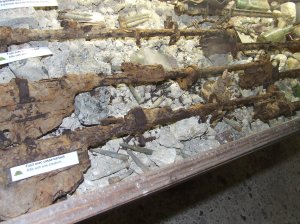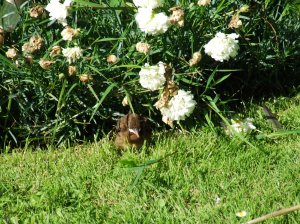Yesterday, a hundred years ago, the Great War began. Austria and Serbia began the process that dragged the world into war. The metaphor of the Matterhorn tragedy of 1865 has often been used to express what happened. Four climbers were plucked off the mountain when a rope connecting them to three others, broke. They were on their way down. It is often more difficult to get out of a situation than to get into it. The weight of the uppermost climber pulled the second one loose. Their combined weight peeled the third and then the fourth from the face of the crag. The ties that bound them together, were their undoing. The watchers below were helpless to do anything. The tragedy became the subject of paintings and engravings. After all, the leader of the expedition was Edward Whymper, an artist in love with the Alps.
Professional historians say that the situation was much more complex than this metaphor. Of course it was, but Austria pulled in Germany while Serbia plucked the Russian Empire to its destruction, then France, Belgium, the British Empire and any innocent bystanders who happened to be watching. Portugal was wary of Germany in Africa, so they sent troops to Belgium. The French brought Indo-Chinese and Senegalese to Europe. Australians and Dubliners went to Turkey. Keep an eye on the Japanese, not that they could pose any serious threat to The Great Powers. The Arabs are getting restless. A glorious opportunity for world strategists to display their skills. Spread out those maps. Send in the cavalry. Send an expedition to Mesopotamia. That should keep those blighters quiet for a century or two. King Hammurabi of Mesopotamia, in Biblical times, made laws for the protection of widows and orphans. No need to worry about them. It will all be over by Christmas.
It’s a load of shit. Bird shit in fact. The first naval battle was off the South American coast, where Britain and Germany fought to secure the supplies of bird guano from Chile, to make high explosive, to fill the millions and millions of shells needed to dismember millions and millions of people and destroy the drainage of the rivers of Flanders. The shells are things of beauty, works of art. My father defused one of those small shells and brought it back from the war as a souvenir. He saw lads doing the same thing on ammunition dumps and blowing themselves up in the process. There is an art to removing the detonator and the high explosive. Handle with extreme care. It is safe now. In his old age he gave it to me. Their manufacture ensured full employment and liberated women to take paid labour. What could be wrong with that? Famine, Plague, War and Death kicked their horses into a canter. Welcome to the Apocalypse. The troops marched to the front. The khaki-clad British, sensibly, took taxis. The brightly coloured French despised camouflage. They relied on élan. The Russians promptly got lost. The Kaiser turned to his chemists to fabricate guano. While you’re at it, make me some poison gas.
There were other allegorical figures linked together on that slippery slide into catastrophe: Pride, Covetousness, Lust, Anger, Gluttony, Envy and Sloth. They all brought their talents to the conflict. You could mention also, Irony, Stupidity, astonishing Charity, Mercy, Generosity, Patriotism and Honour, Humour, Endurance and heart-breaking Courage. Poets idealised the shedding of blood. Artists tried to depict the grim reality. Musicians lifted the spirits. In La Grande Illusion a disillusioned soldier remarks that there would be no wars if there were no brass bands. We all love a brass band.…and we won’t be back till it’s over over there…That film was made by Renoir, son of Renoir the artist. There are many things to love about old Renoir. I particularly admire his remarks about the necessity of keeping the house safe for children: removing razor blades and anything that might injure them, poisonous fluids and chemicals etc.
However, it may be necessary in a war to kill children, along with their mothers, fathers, sisters, brothers, grandparents and neighbours, if strategy demands it. This is of course, regrettable and should be avoided if possible, by extensive leafleting in advance, as is done in the present conflict in Gaza. The fact that they have nowhere to run to is a sad irony of the situation. That gun is a thing of sinister beauty, a work of art and precision. It is sited at Sanctuary Wood. Who sought sanctuary there? Where do the children of Gaza seek sanctuary? In a playground? In a school? In a hospital? Not right now. Don’t you know there’s a war on? God fights on the side of the big battalions, with the big guns.
My brother, who knows a bit about museums, accompanied me to Flanders. He took issue with the way artefacts (objects made by art?) were displayed at the Ulster Tower museum. ‘These items should be displayed in atmosphere controlled environments’ he pointed out. ‘They will deteriorate over time.’ ‘Don’t worry,’ replied the official.’We can always go outside and dig up some more.’ That is the truth.
Plenty more where George Nugent came from. His name is attached to a cross.
When I was a child, my mother took me to the National Museum. I saw wonderful things. One thing that puzzled me was the inscription on the belt-buckle of an Irish Volunteer uniform: Gott Mit Uns. It wasn’t Irish. I asked her what it meant. ‘It’s German, ‘ she told me.‘God is with us. The Kaiser, out of the goodness of his heart, sent over some uniforms for the Irish Volunteers.’ What a kind man! I wonder how his chemists got on.
Kipling was a strong advocate of the war until the day an irate father challenged him at a recruiting rally. ‘Why don’t you send your own bloody son?’ he shouted. Kipling had done everything he could think of to keep his boy safe but he could no longer shield him. The boy was killed. Kipling learned a hard lesson. When my father died, or as an old soldier, faded away, at the age of 82, my little son wrote in Our News in school: ‘My Grandad died and we have his shell on the mantlepiece.’ It made for a very puzzled teacher. I tried to write about his experience, in my novel, Reprisal. Maybe I should have mentioned his shell. My father would have smiled at the little boy’s version. He would smile too at the sudden enthusiasm for The Great War in Ireland after a century of shamefaced denial.
The Great War was the war to end all war. That’s day one over anyway.




































